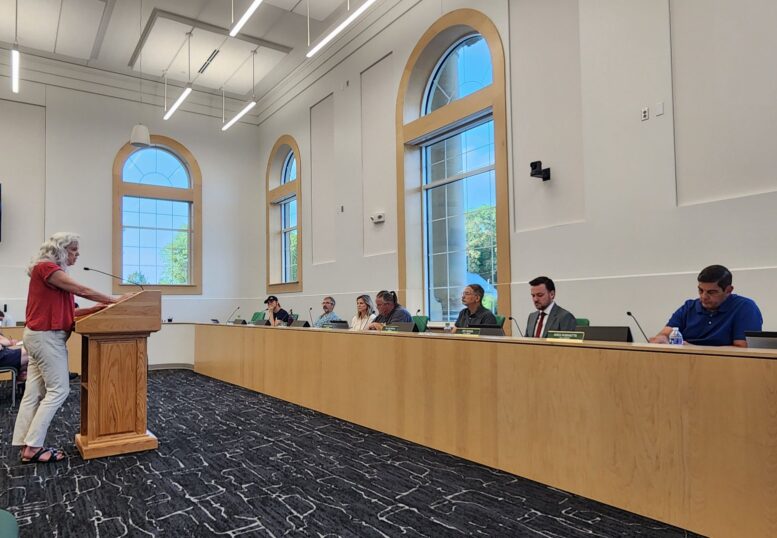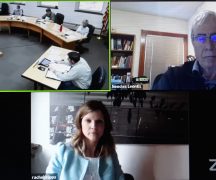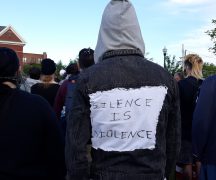By JAN McLAUGHLIN
BG Independent News
It’s the tale of two perspectives on a plan to lessen the housing shortage in Bowling Green.
On one side are homeowners in older neighborhoods, saddened to see older houses divided and rented out as apartments. One of their ideas is to buy older split houses that can be reverted back to single-family homes, and then sold to owners committed to making the houses their homes.
On the other side is Katelyn Elliott, representing families who rent homes in Bowling Green. She opposes renters losing their affordable homes to people who have enough income to buy a house.
Both sides presented their perspectives to Bowling Green City Council on Monday evening.
Kathleen Dennis shared the “Call to Action” proposal suggested by the BG Save Our Neighborhoods Group.
“BG is facing a severe housing shortage,” Dennis said. “BG SONG believes it is possible to address these challenges with unique and creative approaches to housing and improved neighborhood infrastructure.”
One goal is to transform old unused industrial sites into attractive housing developments.
The new zoning code in 2023 allows for residential housing in some of the older light industrial and commercial areas of the city – now designated as Mixed Use Neighborhood Zones.
Bowling Green has some pockets of old industry tucked among residential areas. Those areas could be developed into condominiums, tiny houses (trends in other cities across the U.S.), little flats, and homes for retirees, with smaller neighborhood businesses next door.
BG SONG is also interested in buying some rental properties – specifically single family homes that have been divided into apartments – in the older neighborhoods in the city, refurbishing them and selling them to homeowners to be used as their residences.
It’s that part of the proposal that Elliott finds objectionable.
“BG SONG and the Land Use Plan call for dismantling walkable, affordable housing that has existed for more than 50 years. They claim to do it under the guise of increasing affordable housing,” Elliott said.
The plan will increase the cost of housing in Bowling Green, she added. Turning a building with multiple housing units into one housing unit decreases the supply of housing – which will raise prices and potentially cause renters to lose their homes, Elliott said.
“Many families are already living in those apartmentalized homes. They are paying rents in the $600-$1,000 per month range, which is already unaffordable for some,” Elliott said. “Turning their homes into one home with a likely housing payment of over $1,500 per month is not increasing affordable housing.”
“One thing it would do is increase the supply of a specific type of home that they have in mind for a specific type of person to the detriment of many others,” she said, citing negative comments about renters made during the zoning code update process.
“This plan proposes kicking renters out of their homes in order to replace them with wealthier, higher income homeowners,” Elliott said. “Renters make up the majority of BG residents. They deserve a city council and administration that advocates for their needs and right to live anywhere, next to anyone.”
While individuals can buy properties and do what they want with it, Bowling Green has non-discrimination laws related to housing that include age, marital status, and family status, she added.
“I do not support the city being involved in reducing affordable housing, turning renters out of their homes, and further segregating our city by income level,” Elliott said.
For years city leaders have heard concerns about the lack of affordable housing stock, and about single family homes being turned into rental apartments. The “Call to Action” plan, proposed by the Bowling Green Save Our Neighborhoods Group, is an effort to find solutions to an ongoing problem, Dennis said, presenting a different perspective.
“BG SONG believes it is possible to address these challenges with unique and creative approaches to housing and improved neighborhood infrastructure,” she said.
“Efforts to increase the availability of financially accessible housing in the city will also yield increased opportunities for investment, public-private partnership and entrepreneurial engagement,” she said.
Now is the city’s chance, Dennis said, with recent changes creating opportunities for housing and revitalization:
- The 2023 updates to the zoning code provides for Mixed Use Neighborhood Zones, where housing and businesses may exist side by side.
- A new apartment complex off South Main Street will open soon with 96 units, potentially making some older rental homes available for purchase and renovation.
In partnership with the city, BG SONG is working to gather a diverse group of stakeholders to address the housing shortage. A “Call to Action” meeting is planned for Oct. 12, to gather people that share an interest in solving the problem.
“We seek input from city administrators, elected and appointed officials, realtors, rental property owners, retailers, commercial and residential lenders, building and remodeling contractors, healthcare and social service providers, homeowners, prospective homeowners, and renters,” Dennis said.
Two meetings have been scheduled to discuss the “Call to Action” plan.
- Wednesday, Aug. 14, from 6 to 8 p.m., will be a planning session at the Wood County Committee on Aging, 140 S. Grove St. BG SONG wants to find common interests on housing issues with a broad group of stakeholders in preparation for a community forum.
- Saturday, Oct. 12, from 9 a.m. to 2 p.m., will be a public forum planned in partnership with the city of Bowling Green, at the BG Community Center, 1245 West Newton Road. The goal is to acknowledge problems, identify novel solutions, and create an actionable plan to move forward. Childcare and lunch will be provided. Those planning to attend are asked to RSVP to bowlinggreensong@gmail.com.





